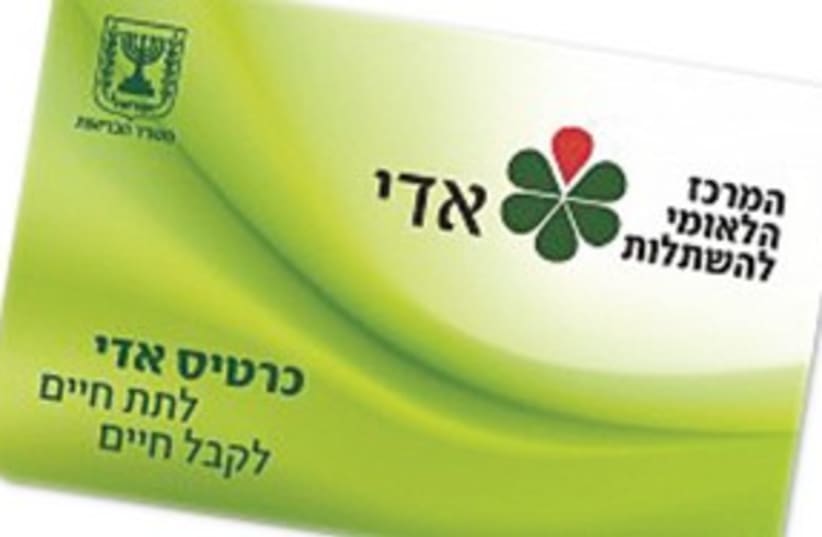Last year brought good news to the Israel Transplant Center and to 392 people whose lives were saved by deceased and live donors.There was an increase by 24 percent of live kidney donors; 56% of family members of deceased agreed to donate organs; 90,000 more people signed donor cards; and almost half of those who received organs from deceased donors were advanced in the queue because they had signed a donor card.In addition, the first transplant of a small intestine was successfully performed and 637 corneas were also transplanted in 769 patients (some were split into parts), giving recipients the gift of sight, the center announced on Sunday.
Of the 143 requests to families whose loved ones suffered lower-brain death, 80 of them consented to give one or more organs. The families said it was important to save the lives of others, while the most common reason for refusal were “religious” – even though modern Orthodox clergymen say donating fulfills a very important positive commandment – and the concern that the body to be buried would “not be whole.”The figure of 392 donated organs was the highest ever.Of these, 104 of the donors were from live relatives (who gave a kidney or liver lobe), and the rest were from altruistic families who gave their loves ones’ organs.Of 248 organs from deceased donors, 109 of the recipients had to wait less because they had previously signed up as potential donors. The number of patients waiting to receive a lifesaving organ dropped from 1,114 in 2012 to 1,075 in 2013.Of the 109 recipients who were advanced in the queue, four received hearts, 25 received lungs, 13 received livers and 67 received kidneys.Of the deceased donors, 112 were donors of kidneys, 10 of kidney-pancreases, 5 double kidneys (usually from elderly donors), 57 of livers, one liver and kidney, 13 hearts, 24 double lungs, 25 single lungs and one “domino” donation of a liver (when an organ or part of one is removed for the primary purpose of a person’s medical treatment and may prove suitable for transplant into another person).According to the center, 787,087 people are registered with ADI, the registry of potential donors (call 1-800- 609-610 or go into the English website at www.itc.gov.il/eng/ contact.html to join).Dr. Tamar Ashkenazi, director of Israel Transplant, said she was very pleased by the increased number of donors and potential donors – the result of hard work and national campaigns by the center and transplant coordinators in all the general hospitals.“The public understands more than ever that respiratory lower-brain death is irreversible and that an external team of experts not connected to transplantation determines death on the basis of strict tests. Supervisors who were appointed according to law found that there were no errors in the declaration of death,” she said.Prof. Rafael Beyar, chairman of the center, congratulated the staff, transplant coordinators in hospitals and transplant teams in the hospitals for these achievements.“Mutual commitment of Israeli citizens to give life is a supreme value, and we welcome the greater willingness to give organs last year to those who need them. We can be proud of our national organ transplant network,” he concluded.Israel Transplant Center reaches all-time high in number of transplants, potential donors
392 lives were saved in 2013 by deceased and live donors; 90,000 more people signed ADI donor cards.
